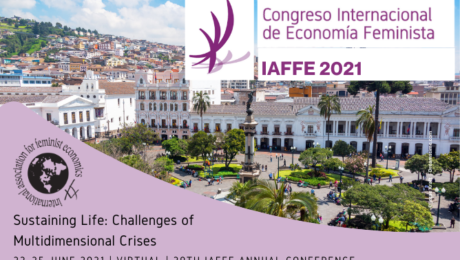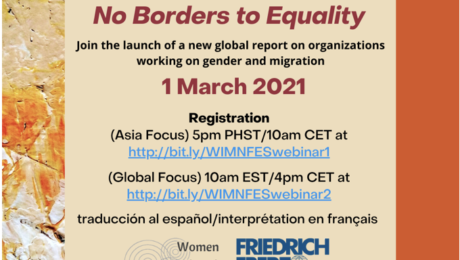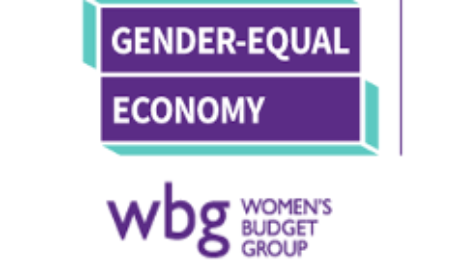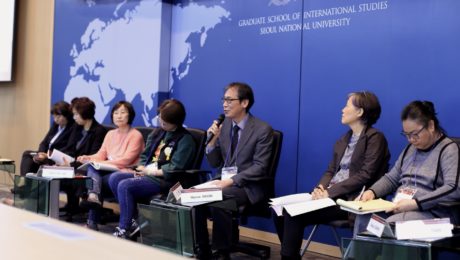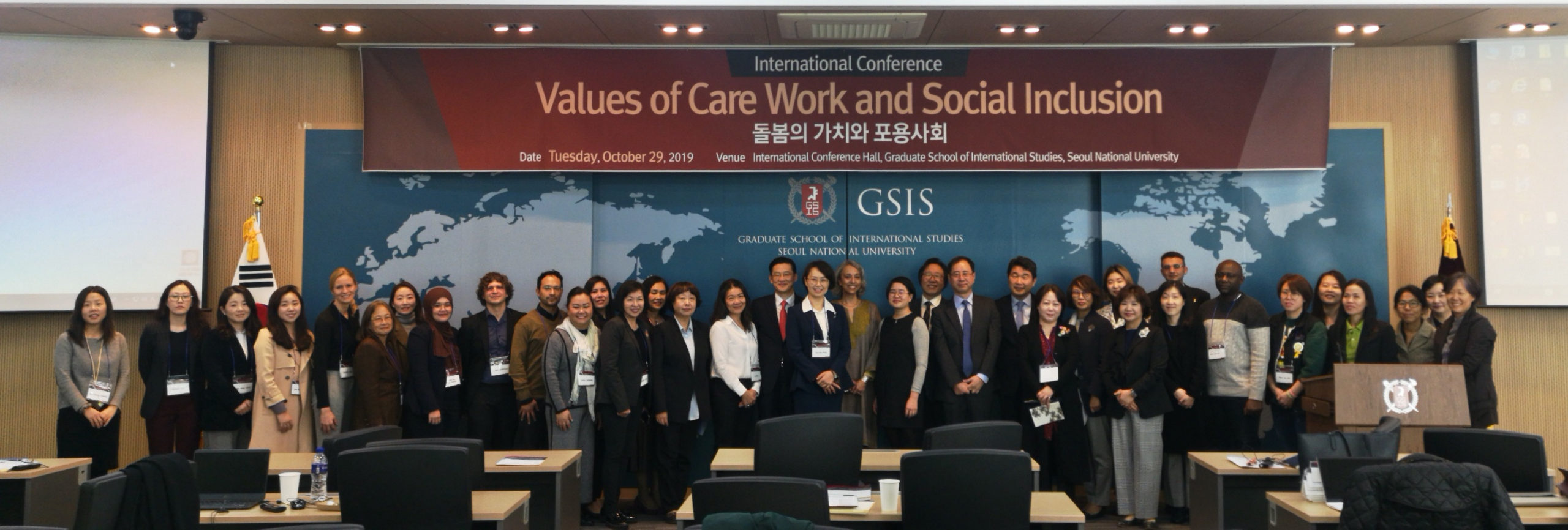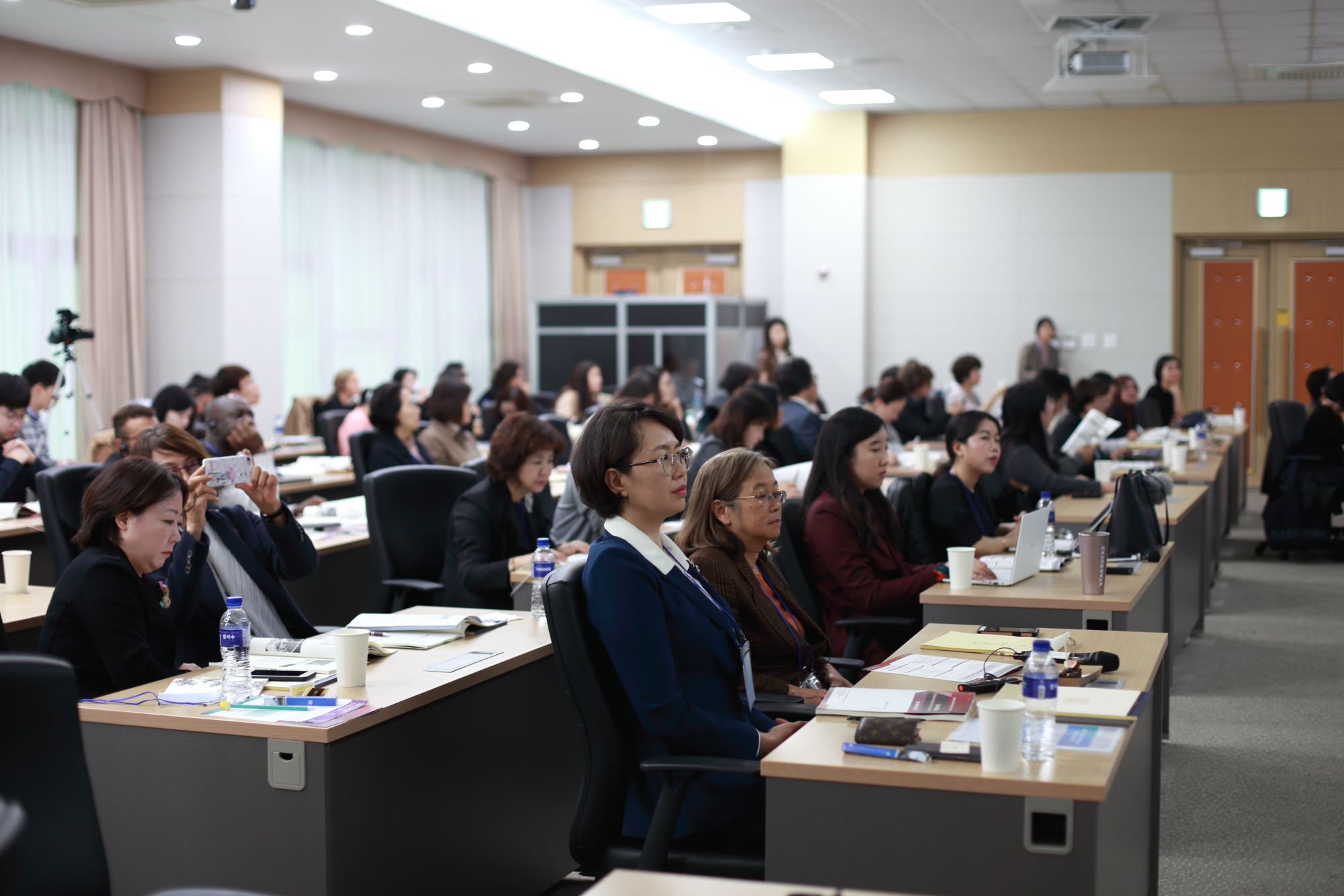CWE-GAM Scholars Leading Two Panels During 2021 IAFFE Annual Conference
This week, the International Association for Feminist Economics (IAFFE) will hold its Annual Conference: “Sustaining Life: Challenges of Multidimensional Crises” starting on Tuesday, June 22nd, and concluding Friday, June 25th. This conference will provide a forum for scholars to discuss feminist approaches to constructing “inclusive and resilient economic and political systems and [sustainting] our environment” in the context and aftermath of the COVID-19 pandemic.
The Care Work and the Economy Project will be leading two panel discussions on Wednesday, June 23rd and Thursday, June 24th: “Those Who Care: Improving the Lives of Caregivers and Workers” chaired by Elizabeth King and Ito Peng, and “Seeking Gender Aware Applied modelings: Case of South Korea” chaired by Young Ock Kim. In the discussions, CWE-GAM researchers will present gender-aware macroeconomic models, data collected from unique surveys of care providers and families, and microeconomic simulations used to better understand care work and the economy.
“Those Who Care: Improving the Lives of Caregivers and Workers” is scheduled for Wednesday, June 23rd from 3:30 to 5:00 pm (EDT time) and will contribute to ongoing efforts to “illustrate the intersectionality of care provisioning, economic growth, and distribution.” With an increasing need for care due to the rapid decline in fertility rates and aging population, South Korea offers a unique context to introduce models and analyze surveys given to households, child and eldercare workers.
There will be four papers presented in this panel:
“The Effects of Public Social Infrastructure and Gender Equality on Output and Employment: The Case of South Korea” by Cem Oyvat and Ozlem Onaran “introduces a post-Kaleckian feminist model to analyze the effects of public social expenditure and gender gaps on output and employment building on Onaran, Oyvat, and Fotopoulou (2019), and extending it with an endogenous labor supply and wage bargaining model.”
“The Quality of Life of Family Caregivers: Psychic, Physical, and Economic Costs of Eldercare in South Korea” by Jiweon Jun, Elizabeth King, and Catherine Hensly “examines the psychic, physical, and opportunity costs of caregiving within the family using data from a special-purpose national survey of 501 households conducted in Seoul in 2018.”
“Quality of Care, Commitment Level, and Working Conditions: Understanding the Care Workers’ Perspective” by Shirin Arslan, Maria Floro, Arnob Alam, Eunhye Kang, and Seung-Eun Cha uses “the 2018 Care Work Economy (CWE-GAM) survey data collected from 600 child and eldercare workers in South Korea [to] analyze patterns of commitment levels among [paid carers] in various settings such as private and public institutions as well as in homes of recipients by conducting tobit regressions and entropy econometrics for robustness checks.”
“Impacts of COVID-19 on Work-Family Balance in South Korea: Empirical Findings and Policy Implications” by Ito Peng and Jiweon Jun examines COVID-19’s unequal impact between men and women in South Korea using data from a survey distributed to “1,252 households with at least one child aged between 0 and 12 in June 2020 to find out how the first 2-month social distancing measure had affected their work, childcare arrangements, and their wellbeing.”
“Seeking Gender Aware Applied modelings: Case of South Korea” is scheduled for Thursday, June 24th from 3:30 to 5:00 pm (EDT time), which will share the results of gender-aware applied modelings and micro simulations for South Korea. The panel will discuss which fiscal policies are likely to be the most effective at reducing gender gaps in paid employment and which forms of public investment best contribute to reducing and redistributing unpaid work between genders and socio-economic groups.
There will be three papers presented in this panel:
“Child and Elderly Care in South Korea: Policy Analysis with a Gendered, Care-Focused Computable General Equilibrium Model” by Martin Cicowiez and Hans Lofgren presents the first care-focused and gendered model in the computable general equilibrium literature for Korea that “is built around a social accounting matrix (SAM) that covers non-GDP household services, singles out sectors for child and elderly care, and disaggregates households on the basis on care needs.”
“Care Support Ratios in Korea and the US” by Gretchen S. Donehower and Bongoh Kye takes a holistic view of care by including both paid and unpaid care for all age ranges and “create[s] [care support ratios] to understand the current care market and whether it is sustainable in the future…in two aging populations- Korea and the United States.”
“Towards a Caring and Gender-Equal Economy in South Korea: How much does the regulation of labor market working hours matter?” by Ipek Ilkkaracan and Emel Memis “use[s] a unique time-use survey on care arrangements by couples with small children in order to explore the potential of [the] reduction of full-time market work hours towards [the] narrowing of the gender gaps in paid and unpaid work.”
To learn more about the panels presented by CWE-GAM researchers and the IAFFE conference, please visit the IAFFE 2021 Annual Conference homepage and program.
This blog was contributed by Lucie Prewitt, a research assistant for the CWE-GAM project.
- Published in Conferences, Events, Expert Dialogues & Forums, Feminist Economics, Gender-Aware Macromodels, Gender-Equal Economy, Macroeconomics, Maria Floro, Research, Rethinking Macroeconomics, Uncategorized, Unpaid Work
Save the Date: Women & Migration Global Mapping Report
On March 1st the Women in Migration Network and Friedrich-Ebert- Stiftung is launching a new report mapping organizations working on gender and migration around the world “No Borders to Equality.”
This new report has mapped over 300 organizations around the world working at the intersection of gender and migration. It is based on a survey and interviews that identify key priorities, concerns, advocacy and mobilization, and which reveal the tremendous potential and importance of bringing a gender perspective to the dynamic issues of migration today.
In addition to the report (which will be available in English and with an Executive Summary in English, Spanish and French), an interactive website is being developed to help in identifying and locating these key groups in the various global regions.
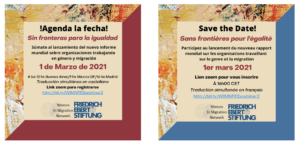
To accommodate global time zones, the launch event will take place at two different times. You can register for either event:
(Asia Focus) 5pm PHST/10am CET
Register at: http://bit.ly/WIMNFESwebinar1
(Global Focus) 10am EST/4pm CET
Register at: http://bit.ly/WIMNFESwebinar2
– traducción al español
– interprétation en français
Be sure to attend this exciting event to learn more.
- Published in Events, Gender Inequalities, Policy Briefs & Reports
Webinar (09/30/2020): Creating a Caring Economy
On Wednesday, September 30th at 10:00 -11:30 am BST, the Women’s Budget Group (WBG) will be a hosting a webinar titled “Creating a Care Economy” which will discuss the work being done within the Commission on a Gender-Equal Economy and the launch of its digital final report. This report comes at a unique time in our history, amidst a devastating global pandemic and on the brink of a harsh economic recession. The commission has taken this unprecedented time to pose the question: “do we really want to go back to business as usual?”
The Women’s Budget Group, (WBG) based out the United Kingdom, is an independent network of policy experts, academic researchers, and campaigners, harboring a vision of a “caring economy that promotes gender equality.” This non-profit organization works hard toward producing vigorous analysis intended to influence policymakers while also building the knowledge and confidence of individuals to talk about feminist economics. WBG achieves this through offering training and creating resources that are accessible and informative.
In February of 2019, WBG launched the Commission on a Gender-Equal Economy. This project works proactively to develop policies that promote gender equality across the UK, and is the first of its kind. This commission is chaired by Diane Elson.
The commission has thus far produced a number of helpful resources. To begin they have produced a short video entitled Spirals of Inequality which delves into how unpaid care is at the heart of gender inequality. This video is also accompanied by a short brief and a longer, more in-depth accompanying paper. They also have an ongoing blog, and have commissioned a number of papers focusing on four areas: Public Services, Social Security and Taxation, and an Enabling Environment. Additionally, they have gathered a number of calls for evidence, which collects evidence from many experts in varying sectors.
The final report that will be explored within this upcoming webinar will lay out a roadmap in which to build a more caring economy, outlining out the how, the why, and acting as a call to action across all the four nations encompassed within the United Kingdom.
Learn more and register for the webinar here.
- Published in Events, Gender-Equal Economy

